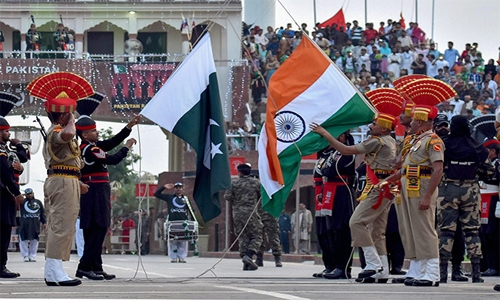India, Pakistan repeat war of words over ‘cross-border terrorism’
Agencies | Islamabad
The Daily Tribune – www.newsofbahrain.com
Pakistan has “categorically reject[ed]” statements by India’s foreign minister regarding “cross-border terrorism”, in which he appeared to be making a thinly veiled dig at India’s western neighbour.
In a statement issued late on Sunday, Pakistan’s foreign ministry termed the remarks by Indian Foreign Minister Subrahmanyam Jaishankar as “baseless allegations”.
“Pakistan categorically rejects terrorism-related insinuations by the Indian External Affairs Minister and other political figures today,” read the Pakistani statement. “Regurgitating of baseless allegations does not turn them into truth.”
Jaishankar made the remarks while delivering a lecture in New Delhi on Sunday, which marked the 19th anniversary of the 2001 attack on the Indian parliament that killed nine people and led to a tense military standoff between the nuclear-armed neighbours.
“At one level, some of the more perennial problems associated with our national consolidation and development will continue,” said Jaishankar. “In particular, a longstanding political rivalry is today expressed as sustained cross-border terrorism by a neighbour.”
Relations between the South Asian neighbours have been tense in recent years, with the two coming to the brink of war during a military standoff following an attack on Indian security forces in the disputed region of Kashmir’s Pulwama town in February 2019.
The countries have fought two of their three wars since gaining independence in 1947 over Kashmir, which both claim in full but administer separate portions of.
In his lecture, Jaishankar warned that future conflicts may not remain in the military domain.
“We are an increasingly inter-dependent world, with many of the accompanying constraints. The era of unconstrained military conflicts may be behind us. But the reality of limited wars and coercive diplomacy is still very much a fact of life.”
Last month, Pakistan’s government released details from a dossier prepared by its intelligence agencies on what it termed India’s “state-sponsored terrorism”.
The dossier included audio recordings purporting to be of conversations between Indian intelligence agents, saboteurs and armed group members in Pakistan, planning attacks on Pakistani soil.
It also included documentation of what Pakistan claimed were meetings at Indian consulates in Afghanistan and bank transfers to armed groups that target Pakistan.
India has categorically denied those allegations, and days later, Indian Prime Minister Narendra Modi linked a foiled attack on Indian security forces to “Pakistan-based terrorist organisation Jaish-e-Mohammed”.
Pakistan’s foreign ministry denied those allegations in a statement.
In his lecture in New Delhi, Jaishankar called for increased integration in his country’s foreign policymaking processes.
“Overall, in an era where foreign policy has got more securitised and defence policy has got more strategised, the integrated outlook that he [PM Modi] promoted has certainly introduced changes in our working style,” he said.
Jaishankar calling for a greater role of security considerations in India’s foreign policy may be received with concern in Islamabad.
“To my mind, adequately securitising foreign policy is for me absolute imperative,” he said.
“And the primary reason for that is quite obvious: there are really very few major states that still have unsettled borders to the extent that we do. Of equal relevance is the unique challenge we face of years of intense terrorism inflicted on us by a neighbour.”
Related Posts

